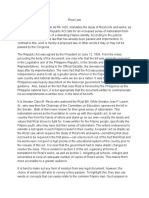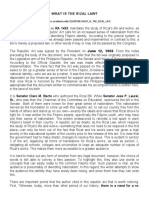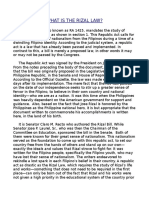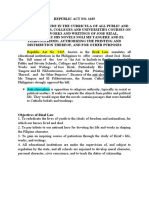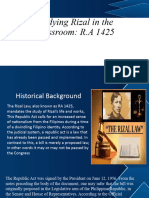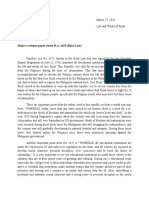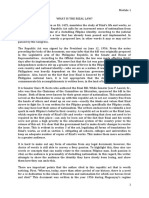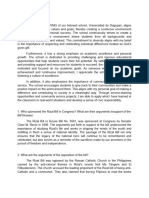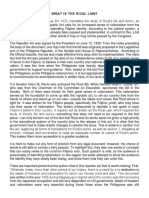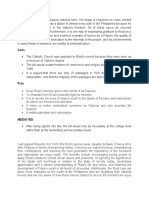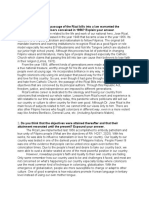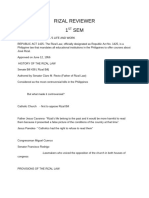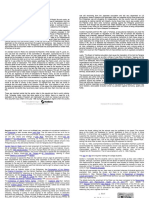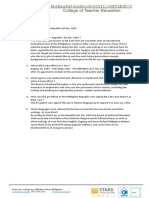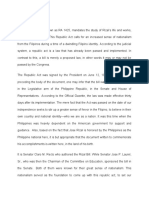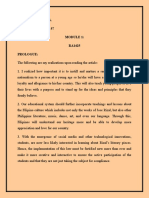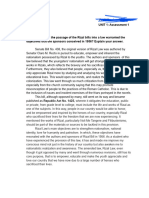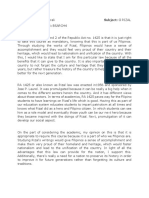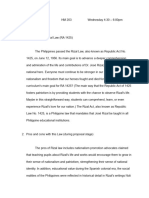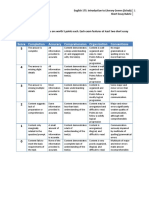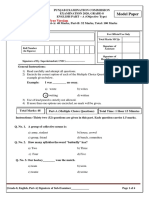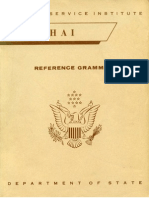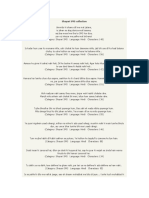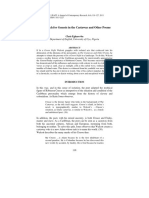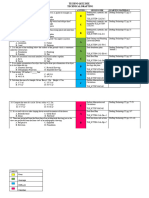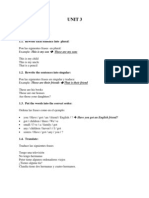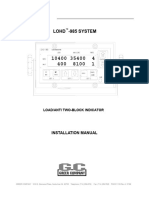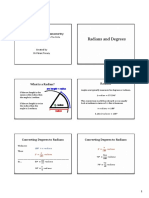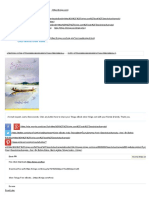0 ratings0% found this document useful (0 votes)
57 views01 - Worksheet - 1A RIZAL
01 - Worksheet - 1A RIZAL
Uploaded by
Adonis CapaldiThe document discusses Republic Act 1425, also known as the Rizal Law, which mandates the inclusion of Jose Rizal's life, works, and writings in the curriculum of all Philippine schools. It requires the use of Rizal's original novels Noli Me Tangere and El Filibusterismo, as well as their translations. The Act aims to encourage patriotism and national identity among students by educating them about Rizal's ideals of freedom and nationalism. It also calls for translations of Rizal's works into other languages and provides funding for its implementation.
Copyright:
© All Rights Reserved
Available Formats
Download as PDF, TXT or read online from Scribd
01 - Worksheet - 1A RIZAL
01 - Worksheet - 1A RIZAL
Uploaded by
Adonis Capaldi0 ratings0% found this document useful (0 votes)
57 views1 pageThe document discusses Republic Act 1425, also known as the Rizal Law, which mandates the inclusion of Jose Rizal's life, works, and writings in the curriculum of all Philippine schools. It requires the use of Rizal's original novels Noli Me Tangere and El Filibusterismo, as well as their translations. The Act aims to encourage patriotism and national identity among students by educating them about Rizal's ideals of freedom and nationalism. It also calls for translations of Rizal's works into other languages and provides funding for its implementation.
Original Title
01_Worksheet_1A RIZAL
Copyright
© © All Rights Reserved
Available Formats
PDF, TXT or read online from Scribd
Share this document
Did you find this document useful?
Is this content inappropriate?
The document discusses Republic Act 1425, also known as the Rizal Law, which mandates the inclusion of Jose Rizal's life, works, and writings in the curriculum of all Philippine schools. It requires the use of Rizal's original novels Noli Me Tangere and El Filibusterismo, as well as their translations. The Act aims to encourage patriotism and national identity among students by educating them about Rizal's ideals of freedom and nationalism. It also calls for translations of Rizal's works into other languages and provides funding for its implementation.
Copyright:
© All Rights Reserved
Available Formats
Download as PDF, TXT or read online from Scribd
Download as pdf or txt
0 ratings0% found this document useful (0 votes)
57 views1 page01 - Worksheet - 1A RIZAL
01 - Worksheet - 1A RIZAL
Uploaded by
Adonis CapaldiThe document discusses Republic Act 1425, also known as the Rizal Law, which mandates the inclusion of Jose Rizal's life, works, and writings in the curriculum of all Philippine schools. It requires the use of Rizal's original novels Noli Me Tangere and El Filibusterismo, as well as their translations. The Act aims to encourage patriotism and national identity among students by educating them about Rizal's ideals of freedom and nationalism. It also calls for translations of Rizal's works into other languages and provides funding for its implementation.
Copyright:
© All Rights Reserved
Available Formats
Download as PDF, TXT or read online from Scribd
Download as pdf or txt
You are on page 1of 1
GE1804
Name: Benjch Adonis Dominic M. Sutingco Section: BSHM701
Date: Sep, 15, 2023 Score:
Directions: Fill in the table below. Avoid any erasures and superimpositions.
TITLE OF Reading Breakdown
THE 1. What is the reading all about?
READING - The article discusses the 1956 Act that made it mandatory to include courses on Jose
Rizal's life, works, and writings, especially his novels "Noli Me Tangere" and "El
Republic
Act 1425
Filibusterismo," in the programs of all public and private schools, colleges, and universities
in the Philippines. The Act emphasizes the importance of teaching Rizal's ideals of freedom
and nationalism to students. It requires the use of original or unexpurgated editions of
Rizal's novels or their English translations in educational courses.
2. What did you learn from the article?
- The Board of National Education is responsible for implementing the Act and creating
appropriate educational materials. Schools must maintain copies of Rizal's works in their
libraries, and these works are designated as required reading. The Act also calls for
translations of Rizal's works into various languages and provides a budget for its
implementation. It took effect upon its approval on June 12, 1956, with the aim of
encouragement a sense of patriotism and national identity among Filipino students.
3. How does the article relate to the lesson?
- The article was somehow related to the lesson since it studies about the Rizal Law or the
Republic Act 1425 and how it explains why it should be implemented and taught in every
high school and college of every school.
How does it develop and/or promote nationalism to you?
- It
promotes nationalism in the Philippines especially to us students by educating us about
the life and principles of Jose Rizal, nurturing an appreciation for their cultural heritage, and
encouraging public responsibility and unity among the Filipino people.
How does it develop and/or promote patriotism to you?
- The Rizal Law encourages Filipinos to feel deep love and pride for their homeland, which
we call patriotism. It achieves this by knowing and learning about the true life of Jose Rizal
and his solid dedication to the Philippines. As we learn about Rizal's sacrifices for our
nation, it ignites a strong sense of patriotism in our hearts.
This law also emphasizes the importance of taking care of our country, which is another way
of showing patriotism. It reminds us that they have a special duty to their fellow Filipinos and
their homeland. By doing good things for their country and working together with others,
they are acting as true patriots.
In essence, the Rizal Law's main goal is to make each one of us proud of our country, a
deep love for it, and be inspired to actively contribute to the improvement of the Philippines.
How does it develop and/or promote volunteerism to you?
- As we have learned the true reason of this law, it promotes and encourages volunteerism
by highlighting Jose Rizal's selfless dedication to the Philippines as a role model for service
and loyalty. It emphasizes public responsibility and duties of each of us, motivating
individuals to actively contribute to their communities. By teaching a love for the Philippines,
the law inspires citizens to engage in volunteer efforts speaking local needs and challenges.
Overall, the law makes even with volunteer initiatives, nurturing a culture of service and
positive change in society. With these, many more are volunteered to be proud and honored
to be a Filipino.
01 Worksheet 1A *Property of STI
Page 1 of 1
You might also like
- Rizal LawDocument3 pagesRizal LawEsther Joy B. EduqueNo ratings yet
- 01 Worksheet 1a.blancaflorDocument1 page01 Worksheet 1a.blancaflorJiere BlancaflorNo ratings yet
- Rizal LawDocument6 pagesRizal LawRenz RocafortNo ratings yet
- History (Chapter 1)Document3 pagesHistory (Chapter 1)Katherine EderosasNo ratings yet
- Chapter 1-Rizal Law: Jose Protacio Rizal Mercado Y Alonzo RealondaDocument5 pagesChapter 1-Rizal Law: Jose Protacio Rizal Mercado Y Alonzo RealondaEdillo BiancaNo ratings yet
- The Rizal LawDocument5 pagesThe Rizal LawjacijanebabyloveNo ratings yet
- What Is The Rizal Law?: SR., Who Was Then The Chairman of The Committee On Education, Sponsored The Bill in TheDocument6 pagesWhat Is The Rizal Law?: SR., Who Was Then The Chairman of The Committee On Education, Sponsored The Bill in TheA.g. Anne GumbanNo ratings yet
- Rizal 2Document51 pagesRizal 2Anonymous NlNY24RNo ratings yet
- Rizal RevDocument3 pagesRizal RevChristine Joy ConsolacionNo ratings yet
- Riz101 - Activity 2 (Lorenzo)Document3 pagesRiz101 - Activity 2 (Lorenzo)johnderrickxNo ratings yet
- ClarkyDocument6 pagesClarkyArlyn LagonNo ratings yet
- Rizal PresentationDocument37 pagesRizal Presentationchrishagapas20No ratings yet
- Module 1 (Introduction To The Course)Document4 pagesModule 1 (Introduction To The Course)Jayvee BustardeNo ratings yet
- Life and Works of Rizal - Importance of Rizal Law or Rizal and Significant Events in The Lize of RizalDocument3 pagesLife and Works of Rizal - Importance of Rizal Law or Rizal and Significant Events in The Lize of RizalwritingbecomesatherapyNo ratings yet
- Assessment 1 RizalDocument2 pagesAssessment 1 Rizalkatrinaricci110No ratings yet
- Ra 1425 Rizal LawDocument7 pagesRa 1425 Rizal LawJulie-Mar Valleramos LabacladoNo ratings yet
- GE9ModuleRizal3 863800275275186Document119 pagesGE9ModuleRizal3 863800275275186Jerick AraNo ratings yet
- Rizal PresentationDocument37 pagesRizal PresentationReycris MasanqueNo ratings yet
- Thought Paper Rizal LawDocument3 pagesThought Paper Rizal Lawlucas100% (1)
- RIZALDocument2 pagesRIZALjeams vidalNo ratings yet
- What Is The Rizal Law?Document4 pagesWhat Is The Rizal Law?Nathaniel LidresNo ratings yet
- RIZALDocument4 pagesRIZALRizalie IcoNo ratings yet
- Pajanilan Worksheet01 Rizal'sLife&WorksDocument1 pagePajanilan Worksheet01 Rizal'sLife&Worksejeey347No ratings yet
- Rizal's LawDocument1 pageRizal's LawAnjulina Osio BatoonNo ratings yet
- PowerPoint Presentation in Rizal SubjectDocument6 pagesPowerPoint Presentation in Rizal Subjectmaicervantes92No ratings yet
- Actvity 1 & 2 - Michelle VistalDocument4 pagesActvity 1 & 2 - Michelle VistalMichelle ArregLado VistalNo ratings yet
- RA 1425 Rizal LawDocument4 pagesRA 1425 Rizal LawJamaica Leslie NovenoNo ratings yet
- GEM 101 - Module 1 ActivityDocument6 pagesGEM 101 - Module 1 ActivitylibraaphroNo ratings yet
- Rizal LawDocument6 pagesRizal LawDaisy Rose TangonanNo ratings yet
- What Is The Rizal LawDocument4 pagesWhat Is The Rizal LawAlbert BertilloNo ratings yet
- My Understanding About Rizals Heroism and Nationalism in Accordance With RA 1425 and The Different Interpretations of The Scholars From Different DisciplinesDocument3 pagesMy Understanding About Rizals Heroism and Nationalism in Accordance With RA 1425 and The Different Interpretations of The Scholars From Different DisciplinesChinie MorlaNo ratings yet
- SWOT Analysis: Rizal LawDocument7 pagesSWOT Analysis: Rizal LawYanaZepol50% (2)
- Pingal Thought Paper Rizal LawDocument2 pagesPingal Thought Paper Rizal LawSTORAGE FILENo ratings yet
- RizalDocument4 pagesRizalRussel Mae CatimbangNo ratings yet
- Lesson 1 AssessmentDocument2 pagesLesson 1 AssessmentMCU ADDICTNo ratings yet
- Reaction Paper 1Document2 pagesReaction Paper 1Anonymous o77DhG9wNo ratings yet
- May 15, 2024-WPS OfficeDocument18 pagesMay 15, 2024-WPS Officelangaminelbertlito8No ratings yet
- WHAT IS THE Rizal LAW - All About The Mandatory LawDocument2 pagesWHAT IS THE Rizal LAW - All About The Mandatory LawHerceeshNo ratings yet
- Life and Works of Jose Rizal Modified ModuleDocument96 pagesLife and Works of Jose Rizal Modified ModuleRamos, Queencie R.No ratings yet
- Rizal LawDocument6 pagesRizal LawRitchelyn ArbonNo ratings yet
- UNIT 2 Module NSTP 1 REVISED MINIMUM 2021Document11 pagesUNIT 2 Module NSTP 1 REVISED MINIMUM 2021BANTAD A-JAY, B.No ratings yet
- BAÑEZ - JAMAICAH - Worksheets CHAPTER I 2 Rizal PDFDocument5 pagesBAÑEZ - JAMAICAH - Worksheets CHAPTER I 2 Rizal PDFPrincess Trinity Kim MontiverdeNo ratings yet
- BUODDocument6 pagesBUODRodolfo MondragonNo ratings yet
- Rizal Summary PDFDocument34 pagesRizal Summary PDFBook of Life fgfhfghfghfghNo ratings yet
- Oria, Maybelyn S. GED0102 - SECTION 57 RA1425 PrologueDocument4 pagesOria, Maybelyn S. GED0102 - SECTION 57 RA1425 PrologueMay OriaNo ratings yet
- Introduction To Rizal RA 1425Document18 pagesIntroduction To Rizal RA 1425Anonymous Uov7wXNo ratings yet
- Buhay at Mga Isinulat Ni RizalDocument3 pagesBuhay at Mga Isinulat Ni RizalmrptbanilaNo ratings yet
- G RIZAL Essay by Stephen P. Gerali BSARCH4Document1 pageG RIZAL Essay by Stephen P. Gerali BSARCH4stephen geraliNo ratings yet
- The Life and Works of Jose RizalDocument22 pagesThe Life and Works of Jose Rizalryvndc.03No ratings yet
- Rizal LawDocument3 pagesRizal Lawangelabelinario08No ratings yet
- Effects of The Rizal LawDocument7 pagesEffects of The Rizal LawAte Kat90% (10)
- PI 100 First SessionDocument26 pagesPI 100 First SessionJulienne AristozaNo ratings yet
- Discuss Briefly The Provisions of RA 1425Document2 pagesDiscuss Briefly The Provisions of RA 1425Clarissa Bergante100% (1)
- I. Republic Act 1425Document9 pagesI. Republic Act 1425Grace MarasiganNo ratings yet
- Rizal AssessmentDocument24 pagesRizal AssessmentKaren Joy DaloraNo ratings yet
- 01 - Worksheet - 1B RIZALDocument1 page01 - Worksheet - 1B RIZALAdonis CapaldiNo ratings yet
- Module 1 IntroductoryDocument9 pagesModule 1 IntroductoryCoseñas CharleneNo ratings yet
- Jose Rizal's Collaborations with Other HeroesFrom EverandJose Rizal's Collaborations with Other HeroesRating: 4 out of 5 stars4/5 (6)
- The Interesting Tales of the Jose Rizal FamilyFrom EverandThe Interesting Tales of the Jose Rizal FamilyRating: 4 out of 5 stars4/5 (10)
- Kalarippayattu e BookDocument63 pagesKalarippayattu e BookVidyanand ThombareNo ratings yet
- English175 Fall2011 Short Essay RubricDocument1 pageEnglish175 Fall2011 Short Essay RubricSachi SummersNo ratings yet
- Grade 8 English MCQ Model Paper - CompressedDocument4 pagesGrade 8 English MCQ Model Paper - CompressedHaris Rehman100% (2)
- How Family Planning Methods Work SwahiliDocument35 pagesHow Family Planning Methods Work SwahiliMoiseNo ratings yet
- Outlining Your SpeechDocument3 pagesOutlining Your SpeechMirza Adwit RahmanNo ratings yet
- QuotesDocument3 pagesQuotesananyaa240103No ratings yet
- Thai Reference GrammarDocument259 pagesThai Reference GrammarSasi75% (8)
- Linguistic and Speaking Nature of French AnthroponymyDocument3 pagesLinguistic and Speaking Nature of French AnthroponymyresearchparksNo ratings yet
- Shayari SMS CollectionDocument9 pagesShayari SMS CollectionShayan KhanNo ratings yet
- The Memory of Mark in The Coptic Church: Samuel MoawadDocument5 pagesThe Memory of Mark in The Coptic Church: Samuel Moawadremon79No ratings yet
- 79812-Article Text-187972-1-10-20120731Document10 pages79812-Article Text-187972-1-10-20120731Star WiXzNo ratings yet
- Curse Israel Ritual by High Priestess Maxine DietrichDocument2 pagesCurse Israel Ritual by High Priestess Maxine DietrichKoty StrongburgNo ratings yet
- Question Techno Quiz BeeDocument2 pagesQuestion Techno Quiz BeeHappy IncognitoNo ratings yet
- Lecture 1 Critical Study of Selected English TextDocument13 pagesLecture 1 Critical Study of Selected English TextMuhammad Hassan RazaNo ratings yet
- Traditional History of Palm Tree and Palm ManuscriptsDocument8 pagesTraditional History of Palm Tree and Palm ManuscriptsIJAR JOURNALNo ratings yet
- Edwin Grammar FinalDocument39 pagesEdwin Grammar Finalsmart telugu guruNo ratings yet
- Nilai-Nilai Pendidikan Dalam Alquran Surah Al-Lahab (Studi Analisis Tafsir Al-Quran)Document14 pagesNilai-Nilai Pendidikan Dalam Alquran Surah Al-Lahab (Studi Analisis Tafsir Al-Quran)As'ad NurNo ratings yet
- BookletDocument27 pagesBookletabdulkarimathamjonov1No ratings yet
- Gsm+Sms Gprs+3G M2M RtuDocument27 pagesGsm+Sms Gprs+3G M2M RtuBraulio HerreraNo ratings yet
- Unit 3: 1. Your FamilyDocument15 pagesUnit 3: 1. Your FamilyDavid AndresNo ratings yet
- A Reassessment of The Origin of The Jagannath Cult of Puri PDFDocument9 pagesA Reassessment of The Origin of The Jagannath Cult of Puri PDFManu V. DevadevanNo ratings yet
- LOHD 985 Installation ManualDocument35 pagesLOHD 985 Installation ManualELVIS GUERRANo ratings yet
- Lyrics 1Document6 pagesLyrics 1irishtelmosoNo ratings yet
- Iexpenses OAF Customizations DocumentDocument115 pagesIexpenses OAF Customizations DocumentshashismbNo ratings yet
- Leaving Cert MathsDocument9 pagesLeaving Cert Mathssarah122122No ratings yet
- Docker For Sysadmins Linux Windows VmwareDocument113 pagesDocker For Sysadmins Linux Windows VmwareSon Tran Hong Nam100% (3)
- M5 UnderstandingTheSelfDocument7 pagesM5 UnderstandingTheSelfDavid SamuelNo ratings yet
- EbookDocument7 pagesEbookOwnown StuffstuffNo ratings yet
- 5E Lesson PlanDocument3 pages5E Lesson PlanWinter Alexandria CardenteNo ratings yet
- Matlab OopDocument746 pagesMatlab OopastonjonesNo ratings yet


